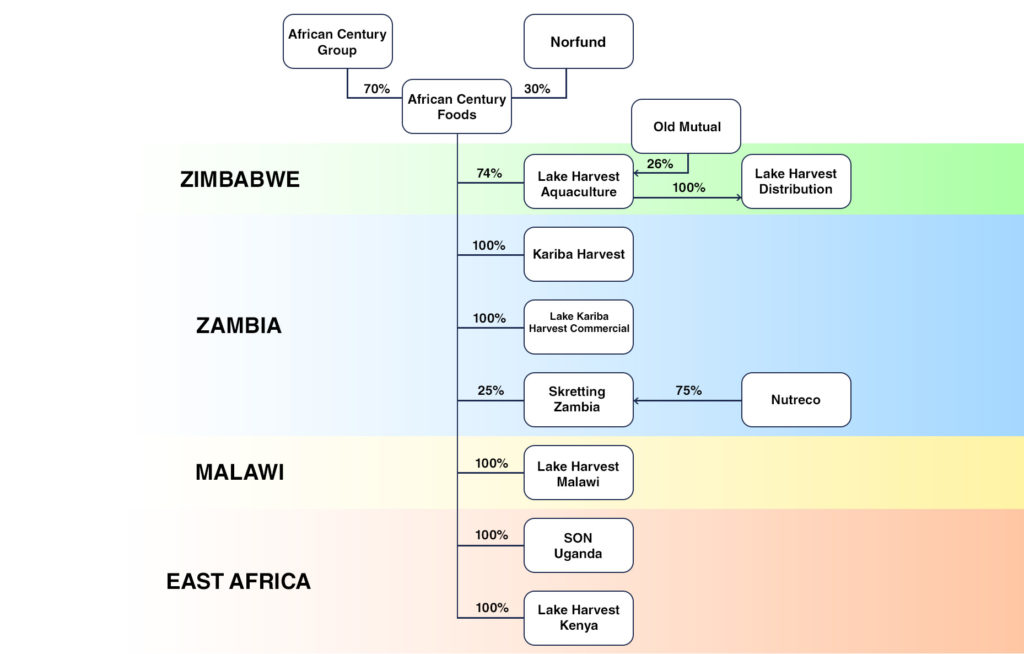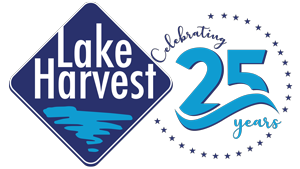Policies Driven
By Values
About Lake Harvest
Lake Harvest, part of the African Century Foods Group has an established set of values and principles which guide group companies in developing procedures, standards and processes to meet the organisation’s commitment to environmental, social and governance (ESG) matters.
Established in 1997, our freshwater fish farm is based at Lake Kariba (Zimbabwe), where we house the largest integrated Tilapia operation in Africa. Our Nile Tilapia (also known as BREAM) is sustainably farmed with state of the art equipment. The quality of our production is well-known, earning our products a home in the hearts of many Africans across the region including Zambia, Malawi, South Africa, Botswana and the DRC.
Established
Countries
Employees
Tons per day | Group
Lake Harvest Values Statement
We strongly believe in ethical business, maintaining integrity and applying the highest standards of transparency and fairness
We embrace diversity, and respect all cultures
We are committed to our people, providing the best opportunities for them to develop and achieve excellence
We believe innovation is integral to creating long-term success
We are passionate about what we achieve
We focus on delivering sustainable and profitable growth, respecting the environment and our natural resources, for the benefit of all of our stakeholders.
Our Environmental, Social & Governance Policies

Environmental

Occupational Health & Safety

Stakeholder Engagement

External Communication & Grievance

Emergency Preparedness & Response

Business Integrity

Corporate Social Responsibility

Waste Management

Labour

Sexual Harassment
Our People
Lake Harvest Zimbabwe employs over 460 people split between Lake Harvest Aquaculture, the fish farm in Kariba with 400 people and 60 employed by the distribution company throughout the country. The fish farm has two factories – a processing plant with 100 people and a feedmill with 55. The balance of Kariba staff are split between the pond/hatchery operation with 60, lake operations with 100 and engineering/admin/logistics with 40 staff. This staff complement in Kariba makes LHA the 3rd largest employer in the town.
Zambia employs 205 people and another 10 in Malawi. Again this is split between Kariba Harvest, the fish farm in Siavonga with 70 people and the balance in the distribution business with 24 outlets spread between Zambia and Malawi distributing Lake Harvest products, as well as mackerel and other food proteins.
The fish farm at Source of the Nile (SON) employs 103 people and the distribution business in East Africa another 15 staff.
In the group, we have an active graduate trainee programme taking gradates each year from University of Zimbabwe, Chinhoyi University of Technology, University of Zambia and Makerere University in Uganda to train graduates in fish farming and processing, accounting, human resources, marketing and engineering. 80% of graduate trainees who have passed through Lake Harvest companies stay on afterwards in managerial positions.
Our Fish
Aquaculture is the practice of farming fish and the most widely farmed fish in Africa is nile tilapia – fresh water bream or Oreochromis Niloticus; it is a native species to Africa and therefore has no restrictions over breeding and production. Tilapia is a fast growing species with the ability to be harvested at 7 months at a harvest weight of 500 grams.
Global demand for fish has been increasing due to changing consumer preferences and increasing health and environmental consciousness. To match demand, world supply of tilapia has climbed exponentially in the last few decades, accelerating from 400 000MT in 1990 to over 4.2 million tons in 2012 – the bulk of growth coming from Asia.
According to NEPAD, Africa has to increase aquaculture by 250% within a decade just to maintain the same rate of consumption, and that is not taking into account increased exports. This is due to overfishing/netting and the protein link between fish and primary agriculture. According to the Food and Agricultural Organisation (FAO), current fish consumption per capita in Zimbabwe is at 1.5kg/ annum v. a regional per capita consumption of 4.5kgs. Fish consumption is a function of cuisine culture, cost effectiveness and its healthy long chain Omega 3 fatty acids, proteins, fat soluble vitamins and minerals like Iron, Calcium, Iodine Zinc and Selenium.

